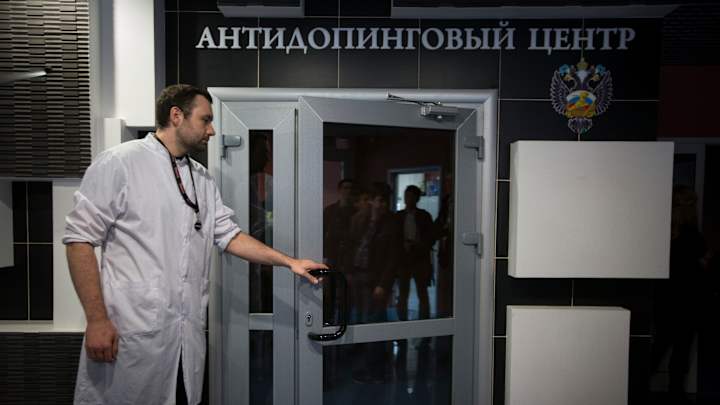Doping lab stands quiet as Russia swept by scandals

MOSCOW (AP) Even as Russia is swept by one doping scandal after another, the national anti-doping laboratory stands almost idle.
Hidden behind a tall fence, a security checkpoint and an anonymous facade on a Moscow sidestreet, the lab's 52 workers have tested just 15 blood samples this year with their cutting-edge machines because the World Anti-Doping Agency has banned them from doing most of their work.
The reason is Grigory Rodchenkov, the mustachioed scientist who was the lab's director until a WADA commission's report in November accused him of covering up doping by star Russian athletes and destroying more than 1,400 samples to keep them from investigators.
Rodchenkov resigned within days and was silent until he told the New York Times that he had helped to cover up more doping at the 2014 Winter Olympics by secretly switching out tainted Russian samples for clean ones at night in the Olympic lab in Sochi.
That Sochi lab was largely staffed by his Moscow colleagues, among whom Rodchenkov inspires mixed feelings.
''He was very appealing, he was very chatty,'' chief blood analyst Grigory Krotov says, but adds that most thought him ''a strange guy.''
Krotov's department is the lab's biggest hope for winning back the trust of global anti-doping authorities.
WADA allowed the lab to begin limited blood testing again May 12, dealing only with out-of-competition samples from certain sports' so-called ''biological passport'' programs, which track changes in an athlete's blood over time.
The lack of a blood-testing facility in Russia created a logistical headache for anti-doping authorities, since blood samples must reach a lab within 48 hours and deep-freeze transport out of the country can be costly. ''The existence of a laboratory in Russia is important for WADA,'' Krotov said.
The lab remains barred from testing any urine samples, including 11 which were taken shortly before the lab lost its accreditation last year and are still awaiting analysis, staff said. Up to 4,000 more already-tested samples wait in a vast freezer chilled to -23 Celsius, in case they have to be re-examined in future.
The urine analysis department is full of staff in white coats who while away the time filling out forms and ensuring machinery is in good condition. Occasionally, WADA sends test samples to check their skills. A padded winter jacket hangs on the freezer door for staff to wear when they venture inside the frozen archive.
Even though almost all of the staff are the same as when the WADA report damned Rodchenkov and his lab, acting director Marina Dikunets says ''colossal work'' is being done on reforms. And she hopes the lab will be fully licensed again in November, likely under a foreign director to be appointed with WADA's backing. That will ''remove all suspicions,'' she said.
Dikunets defended the staff who had worked alongside Rodchenkov - including herself - while in Sochi at the 2014 Olympics. Rodchenkov told the New York Times he acted alone when allegedly switching samples at the Olympic lab, except for the help of a man he believed to be from the Russian security services.
''Every employee who worked in the Olympic laboratory did their work professionally. I can't comment on (Rodchenkov) because I don't know,'' she said.
When the Sochi allegations came out, ''personally, I was very surprised and I don't understand,'' Dikunets said. She refused to be drawn on the details of Rodchenkov's allegations, or whether his alleged sabotage of the Olympic testing system meant similar subterfuge could have happened at the Moscow lab - which handled samples for events including the 2013 track world championship and last year's world swimming championships.
Despite having little or no work to do, morale is high, insists Krotov, whose suite of analysis machines bears stickers giving them geeky nicknames such as R2-D2, the ''Star Wars'' robot.
''Everyone's staying on because it's interesting work from a scientific point of view,'' he said. ''We're doing everything we can to get back credibility and trust.''
